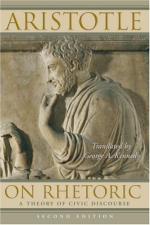
|
| Name: _________________________ | Period: ___________________ |
This quiz consists of 5 multiple choice and 5 short answer questions through Book III, Chapters 13-19.
Multiple Choice Questions
1. Which one of the following would be an example of amplification?
(a) The effective results of a previous political plan.
(b) The positive effects of a political plan.
(c) The ineffective results of a political plan.
(d) The unintended effects of a political plan.
2. As pointed out by Aristotle, what advantage did a speech that included a surprise have for a listener?
(a) The listener would be more likely to repeat it.
(b) The listener would be more likely to agree with it.
(c) The listener would be more likely to remember it.
(d) The listener would be more likely to understand it.
3. Which kind of distinction was made by Aristotle between war and peace, and national defense?
(a) Complicated.
(b) No difference.
(c) Distinct.
(d) Subtle.
4. Since Aristotle explained the difficulty of using enthymemes in political oratory, what did political rhetoricians mainly use instead?
(a) Supporting facts.
(b) Supporting opinions.
(c) Speculation.
(d) Examples.
5. Which one of the following was not included in Aristotle's recommendations for orators on how to write and speak their arguments?
(a) Eloquent style.
(b) Convincing delivery.
(c) Abundance of detail.
(d) Non-logical means.
Short Answer Questions
1. Based on Aristotle's views, how should any good speech be appropriate?
2. How did Aristotle describe the feeling of friendship?
3. Why did Aristotle think the political rhetorician should show that their proposal was in line with the audience's happiness?
4. What did Aristotle think a high value of life in older people led to?
5. According to Aristotle, what should vivid descriptions always depict?
|
This section contains 308 words (approx. 2 pages at 300 words per page) |

|




